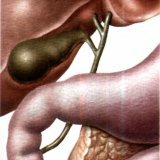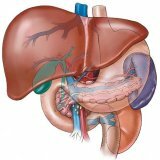Constipation in children: treatment, diet
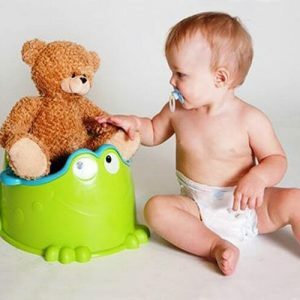
Constipation in childhood is a common phenomenon. Their appearance can be associated with both functional disorders and serious bowel diseases.The tactics of treatment depend on what exactly became the cause of constipation.Therefore, it is necessary to start the recovery of a normal chair from a child not with advertised medicines, but with a doctor's visit and examination.
Constipation is usually called complete absence of bowel evacuation for 2 days or more, or defecation with a small amount of hard feces, accompanied by strong straining and a feeling of discomfort. The appearance of these symptoms in a child should be regarded as constipation, regardless of age and nutritional status( that is, a babe who feeds only on mother's milk may also have constipation).
Contents: What are constipation?What causes constipation in children? What if the child has constipation?What are constipation?
 Constipation is acute and chronic( lasting more than 6 months), functional and organic.Violation of the emptying of the intestine of a functional nature does not have any pathological changes on the part of the digestive and intestinal walls, but organic constipation is a consequence of anomalies and intestinal diseases.
Constipation is acute and chronic( lasting more than 6 months), functional and organic.Violation of the emptying of the intestine of a functional nature does not have any pathological changes on the part of the digestive and intestinal walls, but organic constipation is a consequence of anomalies and intestinal diseases.
Causes of constipation in children
The etiology of constipation in children of different ages is different.So, in infants of the first years of life the main factors leading to a violation of the normal age of the defecation are the following:
- Replacement of breastfeeding by artificial.
- Food allergy to cow's milk proteins( may occur both with the feeding of a baby with cow's milk and with breastfeeding in the event that a mother consumes a large number of dairy products).Lactase deficiency( deficiency of the enzyme that breaks down dairy carbohydrates). .
- Intestinal dysbiosis.
- Congenital malformations of the digestive tract( dolichosigma, dolichokolon and others).
- Forced landing on a pot of a child psychologically not ready for this.
The following reasons are more important for the development of constipation:
- Psychological factors.The most basic of them is the reluctance to go to a shared toilet in kindergarten or school.Constant forced containment of defecation eventually becomes chronic constipation.
- Errors in nutrition( overeating, excessive use of sweets and fatty foods).
- Inadequate fluid flow into the body.
- Inactivity.
- Violation of the usual regime( if the child goes to the toilet from the earliest childhood "in the big" in the morning hours, he should continue this way, changing this regime can lead to constipation).
- Organic pathologies of the intestine.
- Glistular invasion.
- Endocrine diseases.
- Neurological problems.
What should I do if my child has constipation?
The main thing is not to panic and not engage in amateur activities. The first thing parents should do is to consult a pediatrician or a children's gastroenterologist. After the examination and additional examinations the doctor will determine the cause of constipation and give recommendations for treatment.
In 95% of cases, the delay of defecation in children initially has a functional character and can be eliminated by diet, normalization of the regimen and special physical exercises. Parents have a major role in this rather lengthy treatment process.They should support the child psychologically, monitor his nutrition, the frequency of going to the toilet and physical activity.But drug therapy with constipation of a functional nature is receding into the background.
If the cause of constipation is the organic pathology of the intestine or other diseases requiring medication correction, the normalization of the stool is necessarily combined with the treatment of the underlying ailment.
Diarrhea in children with constipation
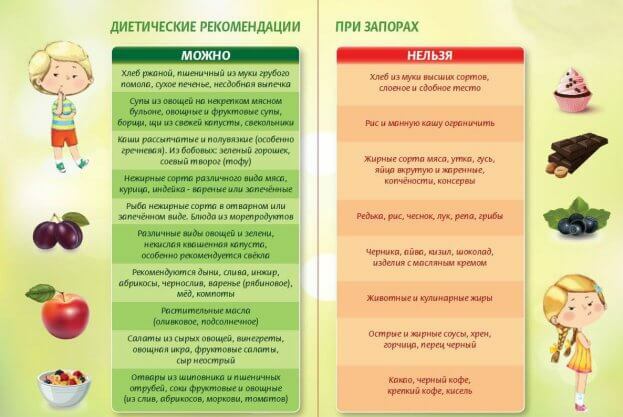
Dietary nutrition is of primary importance in the healing process of children with constipation, because by feeding a child with these or other products, one can achieve loosening of the stool without using medicines.
With the child's propensity to constipation, the diet of his diet is made taking into account the following rules:
- Every day the child should consume fiber-rich vegetables and fruits in heat-treated and raw form( pumpkin, beets, zucchini, apples, apricots, plumsetc.).
- From cereals, you should choose those that relax, - oatmeal, buckwheat, barley.
- To ready meals, you need to add a tablespoon of steamed bran.
- Fats should be presented mainly with vegetable oils , but butter and other animal fats are better generally minimized in the diet.To digest them, the digestive system spends a lot of effort, so constipation can worsen.
- If there is no intolerance to the milk protein and lactose, the child needs to give daily fresh fermented milk products .It is advisable to prepare them yourself from pharmacy starter cultures.Of fundamental importance is the "age" of kefir or curdled milk, since laxative effect is possessed only by 1-2-day products.
- Meat is better to choose low-fat - chicken, veal.
- Sweets should be replaced with fruits, soaked dried apricots, prunes.In general, the consumption of sugar by a child should be reduced by .
- From the diet it is necessary to completely exclude products that increase gas formation.
- As the main sources of liquid, a child can be offered compotes, fruit drinks, kissels, green tea, plain water. But black tea and cocoa are often undesirable because they fix.
The baby's nutrition should be frequent, fractional and on schedule.Dishes should preferably be served in a lightly crushed form, this will help to increase peristalsis and more efficient promotion of the food lump through the intestinal tract.
Than to feed the babe, suffering constipation?
If problems with bowel evacuation occur in the infant of an infant feeding on mother's milk, the mom must necessarily revise her diet. It should not contain any heavy fatty foods, gas-forming products.In addition, it is necessary to limit the consumption of milk, cottage cheese, kefir, sour cream( not more than 500 g of dairy products per day), as well as flour products, bread, rice and sweets.The breastfeeding woman should drink a sufficient amount of liquid( as a rule, this is the norm by weight and plus another 1000 ml).
If the baby is on artificial feeding, it is necessary to choose a special mixture, which will contain lactulose, prebiotics and probiotics.The child can be completely transferred to this mixture or replace it with several feedings per day.
Regimen and physical activity
Regimen is important for restoring regular bowel movements. It is necessary to teach the child to go to the toilet "at large" at a convenient time, preferably in the morning.Even if the child does not feel like it, you should ask him to just sit on a pot or toilet.It is important that the baby is properly seated - the knees should be close to the stomach.To small children for improvement of process of emptying of an intestine during sitting on a toilet bowl under legs or pinches it is possible to substitute a low stool.
To get rid of constipation, the child needs to move more, doing daily restorative charging ( babies should be charged by mom).Favorable for the functioning of the intestine is affected by swimming.
There are even special exercises for treating constipation in exercise therapy. These complexes include:
- breathing exercises;
- all kinds of slopes;
- exercises on the floor with the hips pressed to the stomach;
- walking in place with a high knee rise, etc.
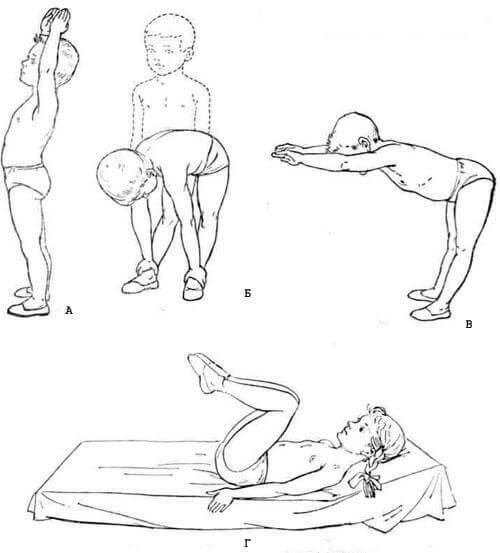
Drugs for treating constipation in children
If the child has persistent constipation, if every act of defecation is accompanied by severe pain, if cracks appear in the anus, inaction can trigger a "vicious cycle".The patient will be afraid to go to the toilet, and the constipation from this will be further aggravated.Therefore, at the first stage of treatment for the evacuation of the intestine may require the use of medicines.
Preference is given by doctors to the most safe laxatives:
-
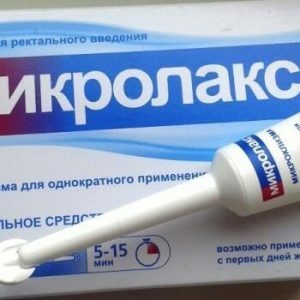 Preparations for dietary fiber.They increase the amount of feces due to the fact that they are a nutrient substrate for intestinal bacteria, which secrete substances that affect metabolic processes and absorb water in the intestine.Waiting for dietary fiber fast result is not necessary - the first defecation can occur at least a day after receiving the drug.
Preparations for dietary fiber.They increase the amount of feces due to the fact that they are a nutrient substrate for intestinal bacteria, which secrete substances that affect metabolic processes and absorb water in the intestine.Waiting for dietary fiber fast result is not necessary - the first defecation can occur at least a day after receiving the drug. - Preparations for lactulose.Their action is associated with an increase in the number of feces.Lactulose can be used for a long time, it is not addictive.
- Glycerin rectal suppositories.
- To microblogs.
In addition, depending on the clinical situation, the doctor can prescribe antispasmodics and regulators of peristalsis.If there are cracks and inflammation of the rectum, it is necessary to treat the child with the help of anti-inflammatory and wound-healing ointments and suppositories.In some cases, the correction of microbiocenosis of the intestine by probiotics( bifido- and lactobacilli) has a positive effect on the stool.
Recommended to read:It is strictly forbidden to give the child laxatives used by adult members of the family, many of these drugs are quite dangerous and can cause the small patient to have various side effects, including severe intestinal cramps and pain.
Detailed information on the causes, treatment and prevention of constipation in children is presented in a video review by Dr. Komarovsky:
In conclusion, I would also like to note that fighting constipation in childhood is very important, because this disorder affects negatively the child's well-Including on his psycho-emotional sphere.If chronic constipation is not eliminated in childhood, the problem can go to adulthood - according to statistics, about 30% of people who have a chronic impairment of bowel movement, being children, suffer it and in adulthood.
Zubkova Olga Sergeevna, medical reviewer, epidemiologist doctor

